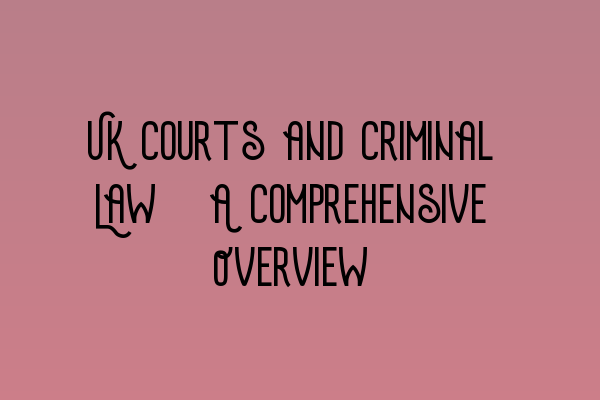UK Courts and Criminal Law: A Comprehensive Overview
Welcome to SQE Criminal Law & Practice Law UK. In this comprehensive overview, we will delve into the workings of the UK courts and its implications on criminal law. Whether you are a budding legal professional or someone with a general interest in the subject, this article aims to provide valuable insights into the UK judicial system.
The UK Judicial System
The UK legal system operates through a hierarchical structure of courts. At the top sits the Supreme Court, followed by the Court of Appeal, the High Court, and the Crown Court. Each court has its specific jurisdiction, with the Supreme Court being the highest court of appeal in the UK.
When it comes to criminal law, the most significant court is the Crown Court, which handles serious offenses such as murder, rape, and drug trafficking. The Crown Court also hears appeals from the Magistrates’ Court, which deals with less severe criminal cases.
Key Players in Criminal Law
Within the UK courts, there are various key players involved in the criminal law process. These include:
- Barristers and Solicitors: Legal practitioners who represent clients at different stages of the criminal justice system.
- Magistrates: Unqualified volunteers who preside over less serious cases in the Magistrates’ Court.
- Judges: Qualified legal professionals who preside over cases in the Crown Court and other higher courts.
- Juries: Groups of citizens who assist in making decisions on guilt or innocence in serious criminal trials.
The Criminal Law Process
Understanding the criminal law process is crucial for legal professionals and defendants alike. The process typically involves the following stages:
- Investigation: The police gather evidence and conduct inquiries to build a case against the accused.
- Arrest and Charge: If the police believe they have enough evidence, they can arrest and charge the suspect.
- First Court Appearance: The defendant makes an initial appearance in court, usually in the Magistrates’ Court.
- Bail: Depending on the circumstances, the defendant may be granted bail or remanded in custody.
- Plea and Trial: The defendant pleads guilty or not guilty, and a trial takes place if necessary.
- Sentencing: If the defendant is found guilty, the court determines the appropriate punishment.
- Appeals: The convicted defendant or prosecution can appeal the court’s decision.
For a more in-depth understanding of the criminal law process, you may find our related articles on SQE 1 Practice Exam Questions and SQE 1 Practice Mocks FLK1 FLK2 useful resources.
Preparing for a Career in Criminal Law
If you aspire to become a criminal law practitioner, proper preparation and education are crucial. SQE Criminal Law & Practice Law UK offers comprehensive courses for both the SQE 1 and SQE 2 exams. Our SQE 2 Preparation Courses and SQE 1 Preparation Courses provide in-depth knowledge and practical skills necessary for success.
Stay updated with the SRA SQE Exam Dates to ensure you are well-prepared and ready to take the next step in your legal career.
We hope this overview has provided you with valuable insights into the UK courts and criminal law. For more information and resources, feel free to explore our website or contact our team directly.
Disclaimer: The information provided in this article is for general informational purposes only and should not be construed as legal advice. Consult a qualified solicitor for expert legal guidance.
